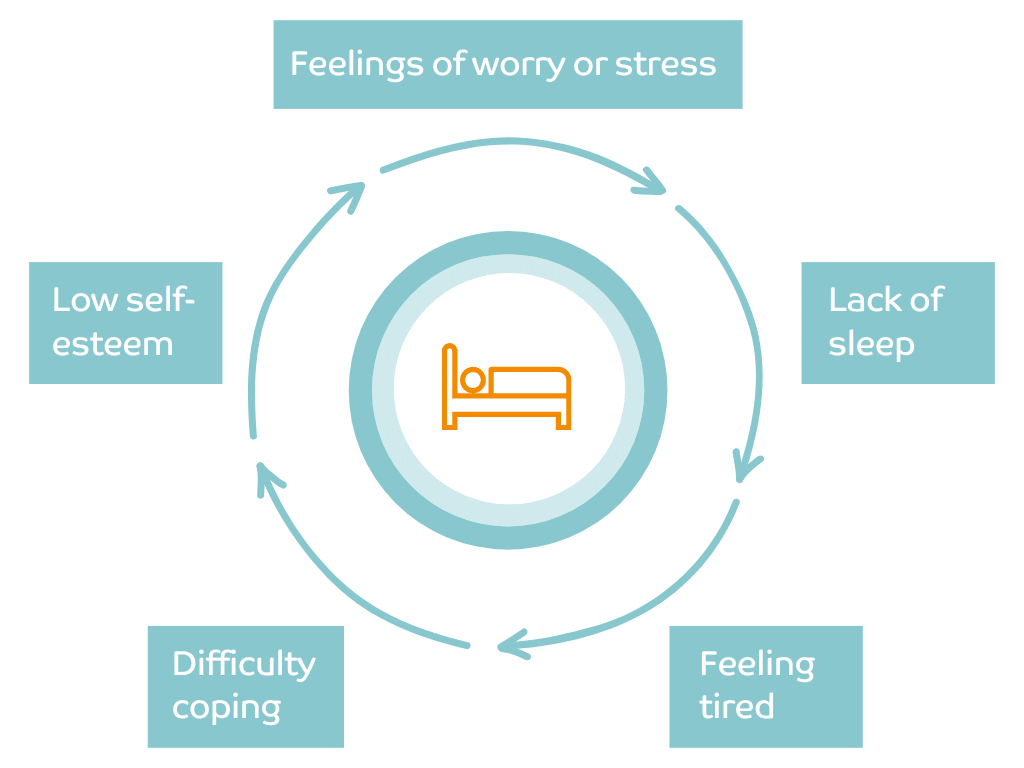It’s a well-known fact that sleep is essential for our health and wellbeing. Lack of sleep can leave you feeling tired and drained day-to-day, but it can also have health consequences in the long term. Sleep is the time you rest and repair, which is essential for mental and physical health. Lack of sleep can lead to mental health issues and make it harder for those struggling to see any improvement.
Living with poor mental health can affect how well you’re able to sleep, and lack of sleep leads to worse mental health. Once you’re in this continuous cycle it can be hard to get out, which will impact your mental and physical wellbeing. Good quality sleep can help you gain a more positive mindset and to feel less irritable throughout the day.
The relationship between sleep and mental health
Not getting enough sleep, or having poor quality sleep, means that your brain can struggle to process information and emotions. Our brain activity fluctuates while we sleep, changing during the different stages we go through in a sleep cycle. Each stage of sleep plays a role in the health of our brain, allowing different parts of the brain to be active throughout the night helping enable better thinking, learning and memory.
Lack of sleep can influence mood and emotional reactivity, and it’s tied closely to mental health disorders and their severity. There’s a two-way relationship between sleep and mental health, where sleeping problems can be both a cause and consequence of mental health problems. Lack of sleep leads to worrying, and worrying leads to poor sleep. You end up in a vicious cycle of poor sleep where your lack of sleep has a negative effect on your mental health, which then increases the likelihood of you having poor sleep.

How to improve your sleep
Whether you have an existing mental health issue or are feeling it decrease due to lack of sleep, the recommendations for improving your sleep are generally the same. Practising good sleep habits can help you take control of your sleep pattern and eventually improve your mental health and wellbeing.
Limit napping during the day
When people are struggling with their sleep at night it can have an effect on their ability to stay awake during the day. Having naps isn’t always a bad idea as they can help you feel more rested, however too much napping will continue the cycle of not being able to sleep at night. Try to limit naps to about 20 to 30 minutes a day.
Set up a routine
Sticking to a nighttime routine can help improve your sleep by getting your mind and body ready for sleep. Getting into a habit of doing specific things before bedtime will help to signal that it’s time to relax for sleep. Take a bath, read a book or practise meditation, whatever it is that works for you and helps set the mood for a good night’s sleep.
Avoid stimulants close to bedtime
In modern life, there are a lot of stimulants that can make it harder for us to sleep. Drinking caffeinated beverages in the late afternoon or evening can make it difficult to fall asleep, so if you do drink caffeine try to cut it off before 2pm. You should also try setting limits on using devices before bed as these can make it more difficult to relax for sleep.
Know when to get help
While these techniques can help improve your sleep and therefore your mental health, it’s important to know when to speak to a professional. If you suspect your sleep problems might be causing or contributing to a mental health condition, seek professional advice.
If you are unable to sleep at all you could be suffering from a sleep disorder, such as insomnia, in which case it would be beneficial to speak to a medical professional. Cognitive behavioural therapy (CBT) is known to be helpful for those struggling with certain sleep and mental health issues, and a professional will be able to recommend the best plan for your specific situation.
Getting help with your mental health
If you’re worried about your mental health, you can get 24/7 telephone access to a professional counsellor with a health cash plan, for mental health advice without the need for a GP referral.
Find out more about the benefits that are included with a health cash plan.
Comments
Can you recommend a sleep CBT specialist who can help me please?
Hi Terry,
Sorry but we can’t recommend specific treatments or suppliers. We recommend doing your own research to find a specialist who can help with your issue.